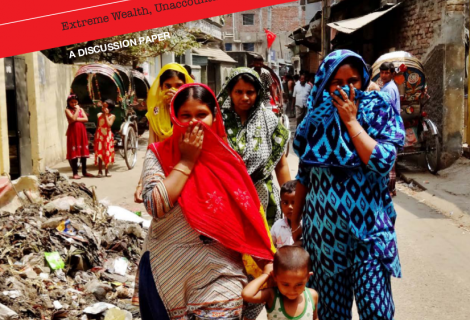
Inequalities of all kinds are on the rise. This is happening despite the fact that the moral, political and economic justifications for such inequalities — whether between women and men, between Dalit and Brahmin, or between black and white — are increasingly being challenged.
Many kinds of inequality are global. Inequalities are interlinked, and one particular kind — inequality in the distribution of wealth — fuels many others. The richest 64 individuals control as much wealth as the poorest 3.5 billion people combined.
This horrifying reality leads to a number of problems. Most significantly, an inordinate amount of power is in the hands of the very richest. Whether in multi-party systems or in authoritarian dictatorships, they find a way to make countries’ social, economic, and political systems work in their interests.
Even authorities such as the International Monetary Fund (IMF), which in the past argued that that economic inequality was an inevitable and justified outcome of increased growth, now agree that the threat it poses is far greater than any of the supposed benefits it was portrayed as having 30 years ago.
The economic policies that have led to a sharp rise in global inequality since about 1980 have been thoroughly discredited. There is now ample evidence that policies such as trade and fiscal liberalization, privatization, budget austerity, deregulation and undermining trade unions lead not just to greater inequality but also to lower rates of growth.
We know what it takes to reduce inequality within countries, because history shows that a combination of strong social protections (especially those that focus on women’s empowerment), industrial policy, and progressive taxation lead to economically more equal societies. This often leads to ordinary citizens having a greater voice in local and national government. Countries should focus on the creation of more and better jobs for women and men, and on ensuring that the rich pay their fair share of tax.
But this may not be enough for the current moment. That is why we recommend that countries and the global community in general consider how best to implement the following set of policies:
- Institute a wealth tax.
- Recognise, redistribute and reduce women’s unpaid care burden.
- Increase corporate democracy — implement structural shifts towards employee control of companies.
- Institute a maximum wage that is proportional to the wage paid to the most junior workers in a company.
- Limit private finance for political parties and political campaigns.
The good news is that we know a lot about what policies are necessary to combat inequality. The bad news is that implementation is largely a problem of politics, not policy. Though a handful of people globally have access to a huge chunk of the world’s wealth, the rest of us — more than 99% of the world’s population — can unite to demand change. Many of the world’s poorest and most marginalised communities are already part of this struggle, and if the rest of us work in solidarity with them to address inequalities, we can create a world free of patriarchy, racism, caste systems, and the rule of the hyper-elite.